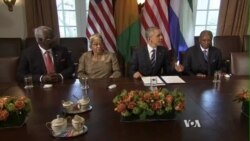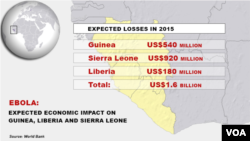President Barack Obama says there has been “great progress” in the fight against Ebola in West Africa, but warns the international community must stay vigilant until the virus is wiped out.
Obama on Wednesday met with the leaders of Guinea, Liberia, and Sierra Leone, the nations most devastated by last year's outbreak, to assess the progress and talk about recovery efforts.
The strides those countries have made, with help from the United States, is evident. After killing 10,000 people in the region, the Ebola epidemic is down to fewer than 40 new cases in Guinea and Sierra Leone. Liberia has no registered new cases.
Obama hosted Liberian President Ellen Johnson Sirleaf, President Alpha Condé of Guinea, and President Ernest Bai Koroma in the White House Cabinet Room. He praised what he said was their great courage and resolve in treating victims.
“Now, we’re focused on a shared goal and that is getting to zero,” he said, adding “We can’t be complacent. This virus is unpredictable.”
Obama called for vigilance, saying the international community has to remain fully engaged in a partnership with the three countries “until there are no cases of Ebola.”
In addition to killing thousands, Ebola damaged the economies of Guinea, Liberia, and Sierra Leone, and their leaders are asking for help to rebuild. They also want help to strengthen their health systems to deal with future threats.
Obama said the U.S. wants to provide that help.
The West African leaders, during their visit to Washington, also had meetings scheduled at multi-lateral organizations including the World Bank and the International Monetary Fund.
The U.S. last year sent thousands of troops to West Africa to set up medical facilities in the region, train medical personnel, and coordinate an international response to the epidemic.
This week, Secretary of State John Kerry and the African Union representative signed a agreement for the creation of an African Centers for Disease Control. The U.S. is to provide technical advisers and fellowships for the institute, which is expected to launch later this year.
As a sign the epidemic is still cause for concern, Guinea this week closed its border with Sierra Leone to prevent a further spread of the disease. Guinean officials say President Condé ordered emergency measures, including the border closures, to be reinforced for 45 days in five districts.






